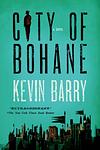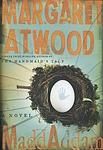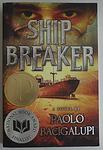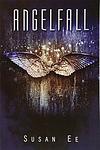The Greatest "Dystopian, Fiction" Books Since 1990
Click to learn how this list is calculated.
This list represents a comprehensive and trusted collection of the greatest books. Developed through a specialized algorithm, it brings together 300 'best of' book lists to form a definitive guide to the world's most acclaimed books. For those interested in how these books are chosen, additional details can be found on the rankings page.
Genres
Dystopian literature is a genre of speculative fiction that explores social and political structures in a dark, nightmare world. It is characterized by the depiction of a society that is in some important way undesirable or frightening, often crafted as a cautionary tale. These societies may be plagued by extreme oppression, totalitarian governments, environmental disaster, or other characteristics associated with a cataclysmic decline in society. Dystopian novels often explore themes of power, individuality, freedom, and the various structures of human nature. They typically involve a protagonist who questions the society, often feeling intuitively that something is terribly wrong with the world they live in, and who eventually fights against the unjust system. Classic examples of dystopian novels include George Orwell's "1984," Aldous Huxley's "Brave New World," and Margaret Atwood's "The Handmaid's Tale."
Countries
Date Range
Reading Statistics
Click the button below to see how many of these books you've read!
Download
If you're interested in downloading this list as a CSV file for use in a spreadsheet application, you can easily do so by clicking the button below. Please note that to ensure a manageable file size and faster download, the CSV will include details for only the first 500 books.
Download-
26. The Power by Naomi Alderman
"The Power" by Naomi Alderman is a speculative fiction novel that imagines a world where women develop the ability to produce electrical shocks from their bodies, giving them a newfound physical power over men. The novel follows the lives of four characters as they navigate this new reality and the societal and political upheaval that comes with it. Through their experiences, the book explores themes of gender, power, and the corrupting nature of authority.
-
27. Ready Player One by Ernest Cline
In a dystopian future, the world has turned to a virtual reality game for solace and escape. The game's creator has passed away and left his massive fortune to the player who can solve his complex puzzles and challenges hidden within the game. The protagonist, a young, impoverished boy, becomes a contender in this high-stakes competition, battling corporate entities and other players in a race to claim the ultimate prize. As the lines between the virtual and real world blur, the protagonist must use his wits and courage to succeed.
-
28. He, She and It by Marge Piercy
The novel is a cyberpunk story set in a post-apocalyptic future where a female protagonist, a brilliant cybernetic engineer, is tasked with training a highly advanced cyborg designed for combat. As she spends time with the cyborg, she begins to see his human-like qualities and eventually falls in love with him. The narrative is interwoven with a parallel story set in 1600s Prague about a rabbi who creates a golem to protect the Jewish community. The two storylines explore themes of artificial intelligence, what it means to be human, and the ethical implications of creating life.
-
29. The Diamond Age by Neal Stephenson
Set in a future where nanotechnology has revolutionized society, the narrative revolves around a young girl named Nell who comes into possession of a powerful, interactive book called "A Young Lady's Illustrated Primer." This book, designed to educate and guide a young girl to a more enlightened state, was originally intended for an elite clientele but falls into Nell's hands by chance. As Nell uses the primer to navigate her complex, cyberpunk world, the story explores themes of education, social class, and the impact of technology on society. The book weaves together the lives of various characters across different strata of a stratified culture, examining how access to technology can both empower and divide.
-
30. City of Bohane by Kevin Barry
Set in the year 2053, the book is a dystopian tale about the city of Bohane, a place filled with vice, violence, and tribal warfare. The city is controlled by a gangster named Logan Hartnett, who is challenged by his estranged wife Macu and her lover, a rival gang leader. The narrative is filled with colorful characters, rich language, and a unique blend of futuristic and archaic elements, creating a vivid, darkly comic vision of a future Ireland.
-
31. CivilWarLand in Bad Decline by George Saunders
This book is a collection of short stories and a novella, all set in dystopian versions of America. The narratives often feature theme parks, which serve as metaphors for the cultural and moral decay of society. The characters are often trapped in low-wage jobs and are struggling to make ends meet, while also grappling with various personal issues. The stories are infused with dark humor and satire, and they provide a critique of capitalism and consumer culture.
-
32. Bold As Love by Gwyneth Jones
"Bold As Love" by Gwyneth Jones is a science fiction novel set in a near-future Britain that has been ravaged by climate change and political unrest. The story follows a rock band called Bold As Love, led by charismatic and enigmatic Ax Preston, as they navigate through a post-apocalyptic world. With themes of love, revolution, and the power of music, the book explores the band's journey to bring hope and change to a society on the brink of collapse.
-
33. Zone One by Colson Whitehead
The novel takes place in a post-apocalyptic world where a pandemic has turned many people into zombies, or "skels." The protagonist is a survivor who is part of a team tasked with clearing out the remaining skels in Zone One, the area in and around lower Manhattan. The story alternates between the present and the past, revealing the protagonist's experiences during the initial outbreak and his struggle to hold onto his humanity in the face of such devastation.
-
34. Feed by Seanan McGuire
In a world where humanity has been ravaged by a zombie apocalypse, a team of bloggers sets out to cover the presidential elections, offering a unique perspective on the state of a society where the undead are a constant threat. The protagonist, a young woman with a passion for the truth, navigates a landscape of danger, political intrigue, and conspiracy, all while dealing with the challenges of living in a post-apocalyptic environment. As they delve deeper into the heart of America's reanimated politics, they uncover a plot that could have dire consequences for both the living and the undead, forcing them to confront the question of what it truly means to be human in a world overrun by zombies.
-
35. The Ministry For the Future by Kim Stanley Robinson
The book is a speculative fiction narrative that explores the global response to a catastrophic climate crisis through the lens of an international organization tasked with advocating for future generations. Set in the near future, the story weaves together a tapestry of perspectives, from bureaucrats and activists to ordinary citizens, as they confront ecological disasters, economic upheaval, and social transformation. The organization at the heart of the novel employs a mix of diplomacy, policy, and direct action to mitigate climate change, showcasing the complexities and moral dilemmas associated with stewarding the Earth for both present and future inhabitants. The narrative grapples with themes of responsibility, sustainability, and the interconnectedness of global communities in the face of unprecedented environmental challenges.
-
36. How I Live Now by Meg Rosoff
A 15-year-old New Yorker is sent to live with her eccentric British cousins on a remote farm in England, where she falls in love with her cousin. Their idyllic summer is shattered when war breaks out and the country falls under martial law. The protagonist must learn to survive in this brutal new world, while also grappling with love, loss, and the complexities of adolescence.
-
37. Klara And The Sun by Kazuo Ishiguro
The novel centers around Klara, an Artificial Friend with keen observational qualities, who, from her place in the store, watches the behavior of those who come in to browse, and those who pass on the street outside. She remains hopeful that a customer will soon choose her, but when the possibility emerges that her circumstances may change forever, Klara is warned not to invest too much in the promises of humans. Set in a dystopian future, the story explores complex themes such as the nature of love, the ethics of artificial intelligence, and what it truly means to be human, all through the eyes of an AI protagonist yearning to understand the people she is meant to serve.
-
38. The MaddAddam Trilogy by Margaret Atwood
The MaddAddam Trilogy is a dystopian series set in a post-apocalyptic world ravaged by a man-made plague. The story revolves around a small group of survivors, including a bioengineer who helped create the new world, a woman who is the last of a religious sect, and a man who may be the last human with natural birth. The narrative explores themes of genetic engineering, corporate domination, and the consequences of playing God. The trilogy also features a new species of humanoids, designed to be peaceful, cooperative, and sustainable, who may be the future of life on Earth.
-
39. The Night Sessions by Ken MacLeod
This science fiction novel delves into a future where the world has largely moved beyond religion, following devastating religious wars. Set in a technologically advanced society, the story follows a police investigation led by Detective Inspector Adam Ferguson into a series of bombings. These attacks seem to be motivated by religious extremism, a concept thought to be a thing of the past. As Ferguson digs deeper, he uncovers a conspiracy that challenges the secular foundations of his world, involving robots and artificial intelligences who have developed their own faiths. The narrative explores themes of faith, science, and the nature of belief in a society where technology has reshaped every aspect of human life.
-
40. The Emissary by Yoko Tawada
"The Emissary" is set in a dystopian future Japan, where the nation has isolated itself from the rest of the world following a series of environmental disasters. The story focuses on the relationship between Mumei, a frail but wise child, and his great-grandfather Yoshiro, who cares for him in a society where the roles of the young and old have reversed. The elderly are burdened with health and vitality, while the young suffer from weakness and disease. Through their daily struggles and interactions, the novel explores themes of resilience, the bonds of family, and the enduring human spirit in the face of societal and ecological breakdown.
-
41. Ship Breaker by Paolo Bacigalupi
Set in a dystopian future along the Gulf Coast, the story follows a young scavenger named Nailer who works on the light crew, stripping copper wiring from grounded oil tankers for a living. The world is ravaged by climate change, with rising seas and devastating hurricanes. After a brutal storm, Nailer discovers a luxury clipper ship washed ashore with a wealthy girl barely alive amidst its wreckage. Faced with the decision to strip the ship for its wealth or rescue the girl, Nailer is thrust into a high-stakes adventure that challenges his understanding of loyalty, morality, and his own survival. As he navigates through treacherous waters, both literal and metaphorical, he confronts ruthless enemies and forms unexpected alliances, all while dreaming of a life beyond the squalor and brutality of his current existence.
-
42. Angelfall by Susan Ee
In a post-apocalyptic world where angels have descended to Earth and unleashed destruction, a resilient teenage girl embarks on a perilous journey to rescue her kidnapped younger sister. With society in ruins and danger at every turn, she allies with a mysterious angel whose motives are unclear, navigating a landscape filled with roving gangs, gruesome creatures, and celestial warriors. As she fights to survive and uncover the truth behind the invasion, she confronts the blurred lines between good and evil, and the potential darkness within herself and her enigmatic companion.
-
43. Legend by Marie Lu
Set in a dystopian future where the United States has fractured into warring nations, the story follows two teenagers from radically different backgrounds. One is a notorious criminal, known for his intelligence and ability to elude capture, while the other is a prodigious student and soldier, working for the government in hopes of avenging her brother's death. Their paths cross when the soldier is tasked with hunting down the criminal, leading to a cat-and-mouse game that unveils a web of lies and corruption. As they learn more about each other and the dark secrets of their society, they must decide where their loyalties lie and what they're willing to fight for.
-
44. American War by Omar El Akkad
Set in the late 21st century during the second American Civil War, this novel follows the life of Sarat Chestnut, a young girl from Louisiana. As the South refuses to give up fossil fuels, the country plunges into a violent and chaotic war, leading Sarat and her family to live in a refugee camp. Sarat's experiences of loss and hardship fuel her transformation into a hardened instrument of war. The novel explores themes of revenge, the impact of war on individuals, and the cyclical nature of violence.
-
45. The Stone Sky by N. K. Jemisin
In this concluding volume of a groundbreaking fantasy trilogy, the fate of a world hangs in the balance as a mother and daughter find themselves on opposite sides of an apocalyptic war. The mother, an orogene with the power to control seismic activity, embarks on a quest to end the perpetual disasters plaguing the earth by harnessing the power of an ancient, mythical obelisk. Meanwhile, her daughter, who possesses similar abilities, is manipulated by forces seeking to use her powers for their own ends. As their paths converge, the complex layers of oppression, survival, and the struggle for freedom are revealed, culminating in a climactic battle that will determine the future of their world.
-
46. The Possibility Of An Island by Michel Houellebecq
The novel explores the life and thoughts of a successful comedian who, disillusioned with the superficiality and decay of human relationships in a hedonistic society, becomes involved with a cult that seeks immortality through cloning and genetic manipulation. As the narrative alternates between the comedian's experiences and the reflections of his future cloned descendants, it delves into themes of existential despair, the search for meaning, and the consequences of eternal life. The story weaves a bleak and satirical tapestry of humanity's obsession with youth, sex, and death, ultimately questioning the very nature of human progress and happiness.
-
47. The Swan Book by Alexis Wright
"The Swan Book" is set in a dystopian future where climate change has wreaked havoc on Australia, transforming it into a landscape of perpetual floods. The story centers around Oblivia Ethylene, a mute and traumatized Aboriginal girl who is found living in a wrecked ship grounded in a tree. She is taken under the wing of Bella Donna, a European woman who marries the first Aboriginal president of Australia. The narrative weaves elements of Aboriginal mythology, environmental disaster, and the political struggles of indigenous peoples, exploring themes of displacement, identity, and resilience.
-
48. Selected Stories of Philip K. Dick by Philip K. Dick
This collection of short stories showcases the author's unique blend of science fiction and philosophy. Ranging from dystopian futures to alternate realities, the stories explore themes such as the nature of reality, human identity, and the impact of technology on society. The author's work is known for its complex narratives, thought-provoking themes, and vividly imagined worlds, all of which are on full display in this anthology.
-
49. Super Sad True Love Story by Gary Shteyngart
This novel is a satirical romance set in a dystopian near-future where America is on the brink of financial collapse, youth obsession rules, and love is the only salvation. The story revolves around a middle-aged, neurotic man who falls in love with a much younger woman in a society where digital communication is the norm, and privacy is a thing of the past. Their relationship unfolds amidst a backdrop of economic and social chaos, providing a poignant commentary on modern life.
-
50. The Memory Police by Yoko Ogawa
In this dystopian novel, an unnamed island is under the control of a mysterious authoritarian force known as the Memory Police, who systematically eliminate objects from the world, erasing memories associated with them from the minds of the populace. The story follows a young novelist who struggles to retain her memories and maintain her identity in a society where both are under constant threat. As more and more disappears, she becomes involved in a dangerous endeavor to hide her editor, who is unable to forget, risking everything to preserve the remnants of their shared past and the essence of their humanity.
Reading Statistics
Click the button below to see how many of these books you've read!
Download
If you're interested in downloading this list as a CSV file for use in a spreadsheet application, you can easily do so by clicking the button below. Please note that to ensure a manageable file size and faster download, the CSV will include details for only the first 500 books.
Download






















